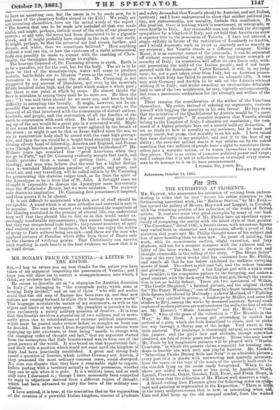MR. BONA.MY PRICE ON VENETIA.:—.A_ LETTER TO THE EDITOR.
beg to return you my best thanks for the notice you have taken of my argument respecting the possession of Venetia; and I hope you will allow me to correct a misapprehension into which, I think, my reviewer has fallen. He seems to describe me as " a champion for Austrian dominion in Italy ;" or belonging to " the retrograde party, which aims at keeping Italy divided," and as one of those " who will not under- stand that the old map of Europe has been torn up, and that new nations are coming forward to claim their heritage in a new world." This language mistakes the nature of my sentiments, as well as the object and limits of my argument. My pamphlet is intended to dis- cuss exclusively a purely military question of frontier. • It is true that this frontier involves a population of two millions, and so neces- sarily gives rise to considerations of extreme political importance, which must be passed under review before so complex an issue can be decided. But so far was I from forgetting that new nations were springing up into existence, or from being " unable to change with the changing order of thought and fact," that my argument started from the assumption that Italy henceforward was to form one of the great powers of the world. It was based on that hypothetical fact; and dealt with a position which could not exist until the kingdom of Italy had been practically established. A great and strong Italy raised a question of frontier, which neither Germany nor Austria, if they possessed the most ordinary common sense, could disregard. No man can dispute that they have a reasonable right to inquire, before parting with a territory actually in their possession, whether they can be safe when it is gone. It is a military issue, and as sneh only have I discussed it ; though I have necessarily been compelled to reply to objections derived from a different region of thought, which had been advanced to parry the force of the military con- clusion.
I have arrived, it is true, at the conviction that on the supposition of the creation of a powerful Italian kingdom, reasons of prudence and safety demanded that Venetia should be Austrian, and not Italian, territory; and I have endeavoured to show that neither political jus- tice, nor statesmanship, nor morality, forbade this conclusion. In this position, there is nothing which is reactionary, or retrograde, or even hostile to Italy. Any reasonable man may cherish the strongest sympathies for a kingdom of Italy, and yet hold that Austria can show a superior title to the possession of Venetia. I have not uttered a single syllable in favour of the restoration of Lombardy to Austria, and I would deprecate such an event as sincerely and as warmly as my reviewer ; but Venetia stands in a different category. Unlike Rome, it is an extreme corner of the peninsula; it can be separated off without compromising in any degree the legitimate strength or security of Italy ; its separation will affect its own limits only, with- out preventing the unity of the Italian people ; and if not incors porated with the dominions of Victor Emanuel, it will, in my judg- ment, be, not a part taken away from Italy, but an Austrian posses- sion to which Italy has failed to produce an adequate title. A man may wish Germany and Austria to be safe on the Adriatic without wishing ill to Italy; and whilst awarding an intermediate debatable land to one of the two neighbours, he may, logically and consistently, feel even a passionate enthusiasm for the strength and welfare of the other.
There remains the consideration of the wishes of the Venetians themselves. My critic, instead of refuting in arguments, contents himself with begging the question in his own favour. He lays down that the retention of the Quadrilateral by Austria would be "a sacri- fice of moral principle." If morality requires that Venetia should belong to the kingdom of Italy, I abandon my conclusion; the com- mand of a higher principle bars out a merely military deduction. I am as ready to bow to morality as my reviewer, but he must not merely assert, but prole, that morality is on his side. I have raised that issue distinctly in my pamphlet, and met it to the best of in ability; the reviewer neither meets it nor refutes me by the naked assertion that two millions of people have a right to constitute them- selves into a separate nation, or to annex themselves to any state they please. That is an axiom of immense political power and range; and I submit that it is not so self-obvious as to compel every states- man to do homage to it on its bare announcement. I remain, Sir, yours, &c.,
Athenaeum, October 14, 1861.
BONAMY PRICE.






























 Previous page
Previous page